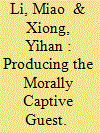| Srl | Item |
| 1 |
ID:
181918


|
|
|
|
|
| Summary/Abstract |
Previous studies on disaster aid emphasize on how aid as gift forms hierarchical relations and thus perpetuates political and symbolic domination. This article, however, highlights the diverse possibilities and capabilities emerged in disaster aid. Based on a 15-month fieldwork, the authors focus on the ethnic minority Qiang’s post-earthquake experience throughout the unprecedented aid and state-sanctioned ‘Gratitude Education’ campaign. This article argues that the moral obligations of gratitude enabled the Qiang’s competition for tourism, education, and other public service resources despite submitting to a seemingly imbalanced power relation in the multi-ethnic region of southwest China. The article further argues that ethnic governance in China is structured on the entanglement of gift exchanges, state control, inter-ethnic competition, and the in-betweeness of ethnic members, which can be problematic yet productive.
|
|
|
|
|
|
|
|
|
|
|
|
|
|
|
|
| 2 |
ID:
169795


|
|
|
|
|
| Summary/Abstract |
To promote a prosocial conscience and behaviour, gratitude education has long been perceived as an effective intervention in formal schooling. Built upon the Foucauldian account of the mutually constitutive relationship between knowledge and power, this paper investigates how an urban school for largely poor and low-income children of migrant workers in Beijing constructed and transmitted knowledge and discourses on gratitude. The authors argue that the students are positioned as what we term “morally captive guests”1 who possess an inferior position in the moral life compared to urbanites, and who are perceived as an instrument for attracting resources and attention to the lower-ranked school. This schooling reproduces extant class relations, whereas the student resistance questions practices of graduating citizenship and educational inequalities.
|
|
|
|
|
|
|
|
|
|
|
|
|
|
|
|